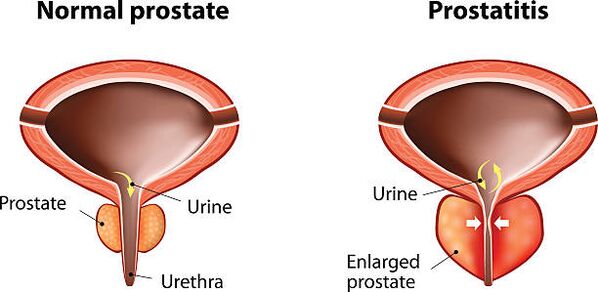Prostatitis is an inflammatory process that sometimes develops in the glandular tissue of the prostate gland with the transition to the muscular part of this organ. It causes perineal pain, weakness, fatigue, urinary dysfunction and sexual dysfunction. Treatment of acute prostatitis is important to prevent dangerous complications of this disease.

At present, both the causes and processes of prostatitis are well understood. Therefore, the urologist has a wide range of tools for the treatment of this disease. These should only be prescribed by a specialist who knows that a particular drug is involved in the development of the disease and takes into account their contraindications. Consider the main groups of drugs used in the treatment of prostatitis.
Antibacterial agents
The most common cause of prostatitis is bacteria. Antibacterial drugs are directed against them.
In order to have a targeted effect on the bacteria that cause prostatitis in a particular person, a bacteriological study must be performed on the secretion secreted by the prostate. Only after knowing the name of the microorganism, its properties and which antibacterial agents it is sensitive to, you can choose a sufficient antibiotic. Modern drugs with a similar direction can treat even severe forms of the disease. The following antibiotics are used in acute bacterial prostatitis:
- Amoxicillin;
- Ceftriaxone;
- Cefotaxime;
- Ofloxacin;
- Ciprofloxacin;
- Azithromycin.
This is not a complete list of antibacterial drugs used to treat prostatitis.
Antiviral treatment
If the prostatitis has a herpetic etiology, it is treated with antiviral drugs. O:
- Acyclovir;
- Valciclovir;
- Ffamciclovir.
The latter drug is the "gold standard" for the treatment of viral prostatitis.
Non-steroidal anti-inflammatory drugs
Medications such as Diclofenac, Indomethacin, Ketoprofen, or Ketorolac are needed to reduce swelling and inflammation of the pancreas, not to relieve the pain that accompanies the disease. They also help the appearance of substances in the blood that facilitate the manifestation of intoxication and reduce high body temperature.
The optimal anti-inflammatory drug is Diclofenac, which also relieves pain syndrome very well. Ketorolac is used if the pain is particularly severe and acute.
Antispasmodics
In the treatment of prostatitis are used drugs that act at different points of spasm of the pelvic and prostate muscles. This helps to improve urination and relieve pain with the drugs of the previous group. Thus, it is applied here:
- Drotaverine: affects smooth muscles and therefore makes the reaction that causes muscle spasms impossible;
- Baclofen: reduces the sensitivity of nerve fibers in the prostate and toxic organs;
- Tamsulosin: affects only the receptors in the bladder and prostate muscles.
Auxiliary drugs
A good addition to the treatment of prostatitis are the following drugs:
- Prostate extract: The drug protects prostate cells from damage during inflammation, improves microcirculation, eliminates blockage of small pelvic vessels and strengthens blood vessels. All these effects are extremely useful for chronic prostatitis. Having an animal that is not of chemical origin will not cause side effects. It can be used as an injection or suppository.
- Palm creeping fruit extract. It is a herbal medicine with a strong anti-inflammatory effect. It also regulates the volume and strength of urine, reduces the unpleasant symptoms that occur when going to the toilet.
- The dietary bioactive supplement contains a complex of proteins and nucleoproteins isolated from the prostate gland of cattle, which affects the metabolism of the prostate, the normalization of its function and, consequently, urinary excretion.
























